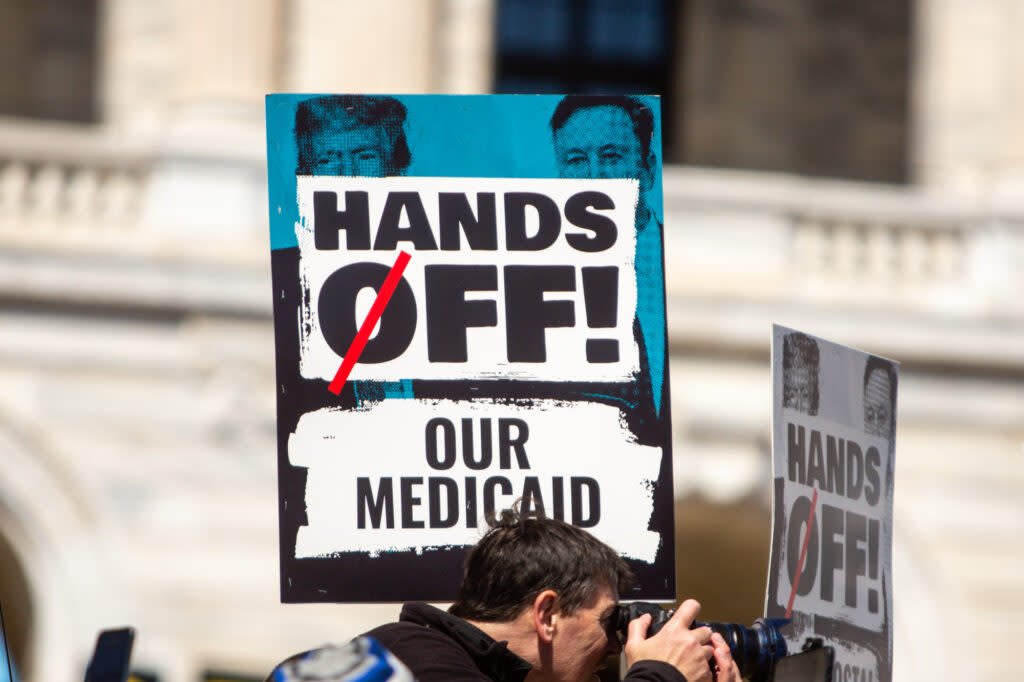
They Lie, Then Deny: Medicaid Cuts, Tariffs, and the GOP’s War on Truth
Posted in :
Despite public declarations to protect healthcare, GOP lawmakers voted for historic Medicaid cuts, deceptive tariffs, and hidden deregulation — then tried to deny it all. Americans deserve truth, not gaslighting.
An unfiltered look at the recent Medicaid cuts and hidden deregulation buried in the Mike Johnson tax bill, the GOP’s shifting stance on healthcare, and how rhetoric continues to outpace reality. With real numbers, personal stories, and candid analysis, this post unmasks the ongoing campaign of misinformation — and why it matters to everyday Americans.
You know that sinking feeling when you find out the rules changed halfway through the game — and no one told you? That’s what happened this week for millions of Americans relying on Medicaid. The so-called ‘big, beautiful’ Trump tax bill quietly sliced billions from public health programs, while some lawmakers who voted yes now play the role of heroes. I once had a friend who swore he’d never eat dessert — caught red-handed with a cupcake, he insisted it was a “muffin.” That’s politics lately: denial, deflection, and a whole lot of sugar-coating. Let’s unravel what’s really happening behind the scenes of Medicaid cuts, tariffs, and legislative double-speak.
Medicaid Hypocrisy on Parade: Vote, Deny, Repeat
The debate over Republican Medicaid cuts has taken a dramatic turn on Capitol Hill. In May 2025, the House narrowly passed the Trump budget bill, a sweeping piece of legislation that included a staggering $700 billion reduction in Medicaid funding over ten years. The final tally? Just 215-214, a razor-thin margin that revealed deep divisions even within the Republican caucus.
Yet, in the days and weeks after the vote, a curious pattern emerged. Several House Republicans who supported the bill began to distance themselves from its most controversial provisions. Suddenly, concerns for “the most vulnerable constituents” became a talking point, especially as public backlash grew louder.
One of the most vocal figures in this reversal was Rep. David Valadao. He and 15 other moderate Republicans signed a letter to Senate leadership, warning against new restrictions on the Medicaid provider tax — a key funding mechanism for state Medicaid programs, particularly in rural areas. Their letter stated:
“Throughout the budget process, we have consistently affirmed our commitment to ensuring that reductions in federal spending do not come at the expense of our most vulnerable constituents.” — Rep. David Valadao
But here’s the reality: these same lawmakers had already backed the House Republicans vote for sweeping Medicaid funding cuts. The bill they supported would slash Medicaid and CHIP by up to $863.4 billion, according to the Congressional Budget Office (CBO). Research shows this would result in 10.3 million people losing Medicaid coverage and a total of 10.9 million more Americans becoming uninsured when combined with cuts to ACA subsidies.
The sudden opposition to the Medicaid provider tax cap is especially notable. While the House bill didn’t include this specific provision, it did contain other major reductions and penalties — including changes that would hit expansion states, parents, and emergency Medicaid funding. Now, with the Senate considering a cap that would disproportionately hurt rural hospitals, these moderates are sounding the alarm. Yet, their initial support for broader Medicaid reductions is hard to ignore.
The Mike Johnson tax bill and the broader Trump budget proposal have been described as “nation-shaping legislation.” But for many, the shape it takes is one of broken promises and shifting justifications. The public sees lawmakers who vote for deep cuts, then claim to defend the very programs they just undermined.
This pattern isn’t isolated. It’s part of a larger trend where lawmakers say one thing and do another. They oppose Medicaid cuts in public statements, but their voting records tell a different story. As research indicates, most of the 16 GOP moderates currently objecting to provider tax changes had no issue supporting the initial Medicaid reductions.
For millions of Americans — especially those in rural communities and low-income families — these legislative maneuvers are more than political theater. They are decisions with real, lasting consequences. The numbers are clear: the Trump budget bill and its Medicaid cuts would leave millions without coverage, while lawmakers attempt to rewrite their own roles in the process.
Tariffs and the Truth: Shell Games at the Checkout
The Republican Party’s latest fiscal agenda is filled with promises of “economic patriotism,” but a closer look reveals a different story—one of Republican tariff fraud and misdirection. At the center is Donald Trump’s proposed 10% universal tariff, a policy touted as a way to make foreign countries pay their fair share. The reality? The burden lands squarely on the shoulders of American families.
Despite the rhetoric, research shows that tariffs do not force other nations to foot the bill. Instead, U.S. consumers pay higher prices at the checkout for everyday essentials—clothing, food, electronics, cars, and more. This is not just an economic impact; it’s a direct hit to working people’s wallets, all while being sold as a patriotic move.
The narrative of “economic patriotism” distracts from what’s really happening: an upward redistribution of wealth. As the Trump tax bill lies pile up, the real winners are not the average Americans but the wealthiest individuals and corporations. The revenue from these tariffs is funneled to fund tax cuts for billionaires, not to balance the deficit as claimed. In fact, the Mike Johnson tax bill—which includes these tariffs—is projected to add to the federal deficit, contrary to the savings claims made by its supporters.
- Trump’s 10% universal tariff is marketed as a cost to foreign countries, but U.S. families pay the price.
- Tariffs are used to subsidize tax breaks for the wealthy, not to reduce the deficit.
- Everyday goods become more expensive, squeezing working- and middle-class budgets.
This pattern of misleading the public is not new. It mirrors the GOP’s approach to Medicaid cuts, where lawmakers first vote for deep reductions, then publicly express concern about the consequences. The same shell game is now at play at the register: tell voters one thing, do another, and hope no one notices the difference.
They call it economic patriotism. What it really is? Economic theft from working people, redistributed upward to fund tax cuts for billionaires.
The Republican tariff fraud is clear when examining the details. The universal 10% tariff, a centerpiece of the Trump tax bill, is projected to raise costs for U.S. families across the board. Studies indicate that these marketplace subsidies are not coming from foreign pockets—they’re coming from yours. And while the bill is branded as a cost-saving measure, the Congressional Budget Office projects it will add to the deficit, not shrink it.
This is more than just a debate about trade policy. It’s a shell game, where the rules are rewritten to benefit the powerful and leave ordinary Americans footing the bill. The same legislative double-speak that frames Medicaid cuts as “fiscal discipline” is now being used to justify tariffs that quietly drain household budgets.
In the end, the truth about the economic impact of the Mike Johnson tax bill and Trump’s tariffs is hiding in plain sight. The costs are real, the benefits are skewed, and the rhetoric is designed to distract from who really pays.
Deregulation and Distraction: Trojan Horses in Legislation
The Mike Johnson tax bill is being sold as a budget fix, but a closer look reveals a different story. Instead of focusing solely on fiscal issues, the legislation is packed with unrelated deregulatory measures that have little to do with balancing the budget. This approach is not new, but the scale and scope of the hidden provisions in this bill set a troubling precedent for how the GOP handles major legislation.
One of the most striking features of the Mike Johnson tax bill is its attempt to block states from regulating artificial intelligence for the next decade. As AI technology rapidly evolves, this move effectively hands unchecked power to tech companies, preventing local governments from responding to new risks or abuses. Research shows that such blanket bans on state regulation can stifle innovation and leave consumers exposed to harm. Yet, this provision has nothing to do with tax policy or budget reconciliation rules. It’s a classic example of a Trojan horse—sneaking in industry-friendly policies under the guise of fiscal responsibility.
Another major hidden change is the defunding of the Consumer Financial Protection Bureau (CFPB). Created in 2008 to protect Americans from predatory lenders and financial scams, the CFPB has played a crucial role in safeguarding public interests. The current bill seeks to strip away these protections, despite no clear connection to budget savings. Many Senate Republicans, as well as consumer advocates, have voiced opposition to this move, highlighting how the bill’s deregulatory agenda goes far beyond what voters expect from a tax or budget package.
The Senate Parliamentarian has flagged several of these provisions for violating standard budget reconciliation rules. These rules are supposed to keep non-budgetary items out of budget bills, but the current legislation ignores these guidelines. According to reports, “many provisions in the bill don’t pass the longstanding requirements that demand budget reconciliation legislation not contain items outside of the actual budget.” This raises questions about the integrity of the legislative process and the true motives behind the bill.
Despite being marketed as a cost-saving measure, the Mike Johnson tax bill is projected to increase long-term federal deficits. This is not just a technical oversight. By loading the bill with ideological priorities—like deregulation and the removal of public protections—the GOP is prioritizing special interests over fiscal responsibility. The impact is far-reaching: from undermining consumer rights to restricting states’ ability to govern emerging technologies.
- AI regulation blocked in states for 10 years
- Consumer Financial Protection Bureau, established in 2008, targeted for defunding
- Senate Parliamentarian: several bill provisions violate reconciliation rules
As one observer noted,
‘And still, Speaker Mike Johnson had the audacity to call it nation-shaping legislation.’
The bill’s Trojan horse of unrelated deregulatory measures underscores how easily special interests hitch a ride on must-pass legislation—undermining oversight and public welfare for years to come. The GOP legislation impact is not just about numbers on a spreadsheet; it’s about the erosion of protections that Americans rely on, all hidden behind the language of fiscal reform.
Who Pays the Price for Political Amnesia?
When the dust settles on the latest House Republicans vote, the reality is hard to ignore: the burden of Republican Medicaid cuts, tariff hikes, and sweeping deregulation falls squarely on the shoulders of those least able to bear it. Despite recent rhetorical reversals, the facts remain unchanged. Lawmakers who once championed “nation-shaping legislation” are now distancing themselves from the very Medicaid and CHIP cuts they helped pass. Yet, the consequences are not erased by words or press releases.
The Congressional Budget Office has made the stakes clear. The House-passed bill would slash Medicaid and CHIP spending by up to $863.4 billion over the next decade, resulting in nearly 11 million more uninsured Americans by 2034. State budgets, already stretched thin, would be squeezed even further, especially in rural areas where provider tax caps threaten the survival of local hospitals. These are not abstract numbers—they represent real families losing access to care, parents forced to make impossible choices, and communities left without essential services.
Public opinion is not on the side of these drastic measures. Polls show that only 36% of Americans support the Republican Medicaid cuts, and research shows that support is unlikely to grow as the true impact becomes clear. The razor-thin 215-214 House vote margin highlights just how divided the country is on these issues. Yet, the legislative doublespeak continues: lawmakers claim to defend the vulnerable while quietly advancing policies that undermine their well-being.
This pattern of “lie, vote, deny” is not limited to healthcare. Tariff hikes, sold as a way to make foreign countries pay, end up raising prices for American consumers. Deregulation is framed as economic freedom, but often strips away protections for workers and families. Each time, the rhetoric masks the reality, and the price is paid by the sick, the poor, and the working class.
“We’re living in a country where the truth is optional, and the consequences are borne by the sick, the poor, and the working class.”
Legislation cloaked in “nation-shaping” language often shapes little but uncertainty and hardship for those least equipped to bear it—unless voters demand transparency and remember every cupcake masquerading as a muffin. The erosion of trust in government is not just a byproduct of policy; it is the inevitable result of accountability deficits and political gamesmanship.
Genuine accountability means tracking not just what lawmakers say, but what they actually do. It means holding them responsible for the votes they cast and the lives those votes affect. As research indicates, widespread public opposition to GOP Medicaid cuts is a signal that Americans are paying attention, even if some lawmakers hope otherwise. The challenge now is to ensure that political amnesia does not become the norm—and that those who bear the consequences of these decisions are not forgotten.
TL;DR: Despite public declarations to protect healthcare, GOP lawmakers have voted for historic Medicaid cuts and hidden deregulation in the Mike Johnson tax bill — then tried to backtrack. Americans deserve to know how these actions impact families and the country’s future.
Trumptaxbilldeception, Medicaidprovidertaxcap, Republicantarifffraud, deregulationhidden inbudget, MikeJohnson tax plan,MikeJohnsonTaxBill, RepublicanTariffFraud, DavidValadaoMedicaid, TrumpTaxBillLies, RepublicanMedicaidCuts, MedicaidProviderTax, MedicaidAndCHIPCuts, HouseRepublicansVote, MedicaidFundingCuts, SenateMedicaidLegislation
#MedicaidCuts, #GOPPolitics, #HealthcareJustice, #TariffTruth, #MikeJohnsonBill, #TrumpTaxBill, #LegislativeAccountability, #RuralHospitals, #DavidValadao, #PoliticalTransparency,#MedicaidCuts, #GOPHypocrisy, #TrumpTariffs, #BudgetDeceit, #HealthcareCrisis, #MikeJohnsonBill, #AIRegulationBan

